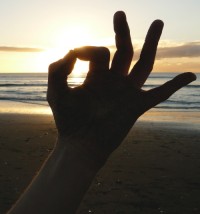This was the easiest sadhana (daily spiritual practice) I’ve done. Simply sitting cross-legged and repeating four lines (in English no less!) over and over.
May I be filled with loving-kindness
May I be well
My I be peaceful and at ease
May I be happy
I finished yesterday, with a twenty minute meditation. Yet this morning, getting stuck into work, I couldn’t wait to do my meditation. So I did. Day 41. This may just be a daily practice for me until… well who knows?
It’s had a profound effect on my level of awareness, and on my general state of calmness. Initially, I started this meditation because I wanted to be more open and connected with people in a heart-filled way. I’d identified that I had a habit of being distant and aloof, and often critical and judgmental.
Yet paradoxically, I also knew that I had a high degree of empathy and in the right circumstances was easily able to open and connect to people. I stumbled across this article earlier this week, and it was like all the jigsaw pieces fell into place.
Is Overactive Empathy Ruining Your Life? details exactly what empathy is and how it can create people who are both cold and distant – self-protection from being over-whelmed by other people’s emotions – and caring and connected.
In short, Anna Conlan says:
Empathy is the ability to temporarily step out of your experience and step into another person’s experience, and perceive it as they do, whether it’s an emotional, mental, physical, intellectual or spiritual experience.
It’s a great skill to have – especially as a yoga teacher! But if you’re unskilled at being an empath, it can also be as confusing as all hell.
There’s been many a time I’ve been feeling great, and rocked into a social situation where no one knew anyone and all of a sudden felt really uncomfortable. Yet I don’t get uncomfortable in situations like this… it took me ages to figure out what was going on… I was feeling the emotions of the other people, and assuming they were my own, so reacting to them as if they were.
Anna goes on to say:
Overactive empathy in relationships: Do you have (or have you had) any of those relationships where you feel what someone is going through so much, when it’s something they’re struggling with, and you really want to help them?
That’s all good and well, but what if you want to help them so much, you start taking on their ‘stuff’ and their problems? What if your boundaries become blurry and you take on responsibilities that aren’t yours? What if you stop allowing them the responsibility and the opportunity to create change and want to create it for them, directly or indirectly?
Overactive empathy is linked to co-dependence and poor boundaries in general and healers have a hard time with this because they’re so often empathic.
Um, tick, tick and tick! Yep, this was why I was having such a hard time in my relationship. I was feeling my partner’s emotions and feelings as my own and doing my best to be aware of what was going on and trying to “fix” it… when it wasn’t even my emotions! Needless to say, a huge light went on.
Now what’s really interested about all of this is I had worked it out by myself before I came across the articles – Anna’s writing just laid it out clearly and compactly for me.
Her second article goes on to explain How to Turn off Overactive Empathy. When I started my meditation, I was doing it thinking I needed to be more empathetic, when actually what I needed was to be more centred and clear about which were my emotions and which were other people’s emotions.
Like the second article goes on to explain, I needed to know how to turn off my empathy as such. Well, not really, more like being able to hold my centre while being open and compassionate too.
And this turned out to be the biggest benefit of my forty day sadhana.
Somehow, it changed things within me so that all of a sudden I can see and perceive other people’s emotions still, but I don’t feel them as my own anymore. I can’t begin to describe how grateful I am for this. It’s a huge watershed for me.
In her second article, Anna Conlan outlines three steps for working with your overactive empathy:
1. Centering yourself – as an energy management tool, to learn to turn off your empathy in the moment and to train yourself to be more centred in general.
2. Raising your awareness of empathy triggers – Understanding your external empathy triggers – that’s to say, understanding which situations and people trigger your empathy in any given moment.
3. Moving from unconscious empathy to conscious choice – understanding why you may not be turning your empathy off; overcoming limiting beliefs and unconscious choices around empathy and setting new intentions for the management of your energy.
Simply doing meditation every single day gave me all of these three things.
It centred me, it raised my awareness and it shifted me from a place of unconscious empathy to conscious choice.
Coming to this awareness about myself has shed enormous light on my patterns of relating to my family during childhood and beyond, plus my patterns in relationships subsequently. I have tended to be a “rescuer” in my relationships, always wanting to help my partners “improve” and “suffer less”. I see now this stemmed from a purely selfish urge to help them move into a better place so I wouldn’t have to keep feeling all of their awful emotions.
How convoluted is that! If I can fix you, then I don’t have to feel your negative emotions anymore. All of this happening on an unconscious level of course.
How much better is it instead to just figure out how to find my own centre, my own boundaries and my own ability to not feel your emotions while still remaining compassionate and open?
Anna sums it up beautifully when she says:
Overactive empathy is an act of self-sacrifice. Is it fun to absorb a load of negative energy that isn’t yours? No! What is negative and what does not serve you cannot serve someone else. It’s called spreading the fear instead of the love.
So, no more self-sacrifice for me. No more absorbing other people’s negative energy and then having to process it myself. And definitely no more spreading the fear!
This whole experiment has confirmed to me just how much a part of each other we truly are, and how important it is that each of us finds out own strong centre so we can radiate out light to each other, rather than absorb each other’s darkness.
Because remember, darkness melts away when you shine a light on it.
The light of meditation has worked in my life – it might be the light of asana or pranayama that works in your life.
I feel like I still need some time to integrate and understand the impact this meditation has had, but I do know I can highly recommend it to anyone who would like to drastically shift the way they experience the world.


Hi KL,
I am so happy this article was helpful to you!
I can certainly relate to the pattern of wanting to rescue people and stop them feeling bad so I could stop taking on their pain.
I love what you wrote here:
“..how important it is that each of us finds out own strong centre so we can radiate out light to each other, rather than absorb each other’s darkness.”
Sums it up perfectly for me.
Blessings xxx
sweeet!
x